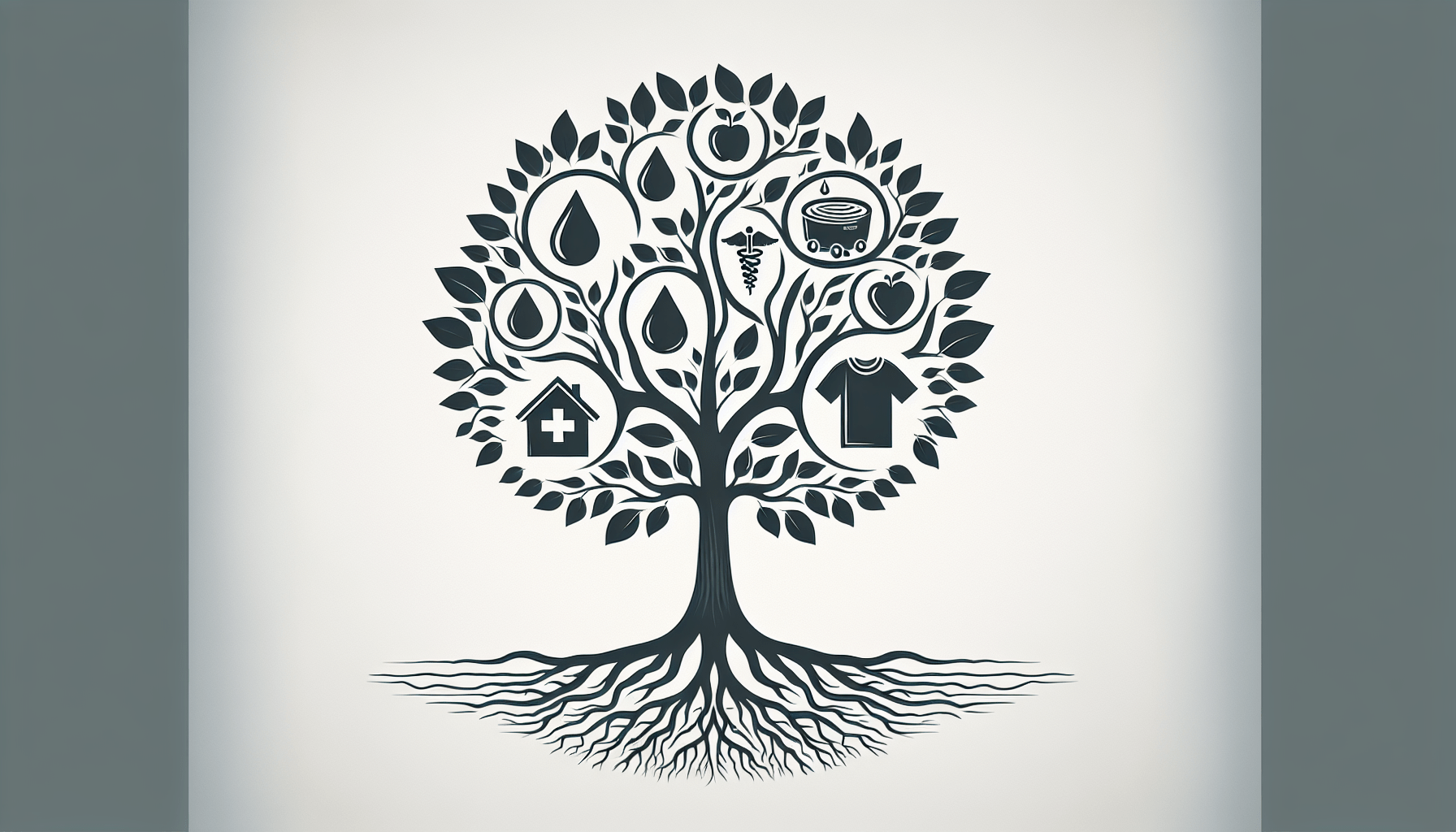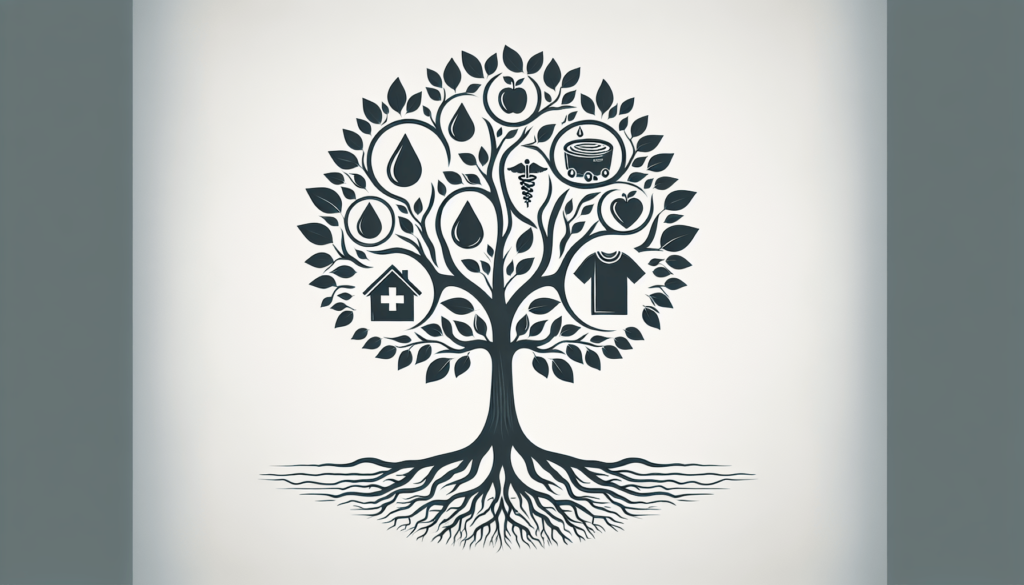
Have you ever stopped to think about what we genuinely need to survive and thrive in this world? Sure, we all like to have nice things, but what are the basic building blocks that keep us alive and well? We’re talking about the essentials, the universal basic needs that we all share as human beings.

Understanding Basic Needs
When we talk about universal basic needs, we’re referring to the fundamental elements that keep us ticking. Without these necessities, our health, well-being, and sense of security can be seriously compromised. These needs are universal, meaning they apply to all humans regardless of culture, background, or lifestyle. In this article, we’ll delve into each of the five basic needs and why they are so critical for all of us.
Why Are Basic Needs Important?
Understanding these needs isn’t just an academic exercise. It’s vital for our practical day-to-day existence. When these needs are met, we can move on to higher levels of thinking and functioning, such as pursuing personal growth and fulfilling our potential. Conversely, when these needs are unmet, everything else sort of falls apart. So, let’s roll up our sleeves and get into what makes us tick.
The Five Basic Needs
The five basic needs are often defined as physiological needs, safety needs, love and belongingness, esteem, and self-actualization. While these categories can sometimes feel a bit abstract, they help us articulate the core needs that are at the heart of human experience.
1. Physiological Needs
First on the list are physiological needs, the foundation of the basic needs pyramid. These include food, water, shelter, and clothing. Without these, survival itself becomes impossible.
Food and Water
We need these to sustain life. It’s that simple. Our bodies run on the fuel provided by food and the hydration from water. Without them, our energy levels plummet, our health deteriorates, and life becomes unsustainable.
Shelter
Shelter, on the other hand, provides us with protection from the elements. It keeps us warm in the winter, cool in the summer, and safe from external threats. It’s our haven, our safe space.
Clothing
Clothing may seem like just a fashion statement, but it’s another critical element. It protects us from the environment, provides comfort, and can even contribute to our sense of identity and belonging.
2. Safety Needs
Once our physiological needs are met, our attention shifts to safety needs. These are all about ensuring we are free from harm, whether that’s physical harm, financial instability, or emotional distress.
Physical Safety
We crave a secure environment. This means living in a place where we don’t constantly fear for our lives or well-being. For some, it could mean having good locks on the doors, while for others, it might mean living in a community with strong social norms that promote safety.
Financial Security
Financial security is another cornerstone of safety. It’s not only about having enough money to cover basic expenses but also about having a safety net for emergencies. Financial instability can be a constant source of stress and anxiety, affecting other areas of our lives.
Emotional Security
Emotional security is often overlooked but equally important. This involves having relationships based on trust and mutual respect. When we feel emotionally secure, we can express ourselves freely and build deeper connections.
3. Love and Belongingness
Next up is love and belongingness. We are social creatures, and relationships are crucial for our mental and emotional well-being. This need encompasses friendships, family relationships, and romantic connections.
Family
Our family often provides our first experiences of love and belonging. They are our initial support system, offering unconditional love and a sense of being rooted.
Friendships
Friendships are the relationships we choose. Good friends offer a different kind of support and companionship, bringing joy and reducing feelings of isolation.
Romantic Relationships
And then there are romantic relationships. These partnerships bring a unique kind of intimacy and connection that can be deeply fulfilling.
4. Esteem Needs
Esteem needs focus on our desire for respect and recognition. This category is split into two parts: self-esteem and recognition from others.
Self-Esteem
Self-esteem is our internal barometer of worthiness. It’s how we evaluate ourselves and our capabilities. High self-esteem allows us to face challenges with confidence.
Recognition
Recognition from others—a pat on the back, an award, or even a simple thank-you—validates our efforts and contributions. It strengthens our sense of worth and value in a social context.
5. Self-Actualization
Finally, we reach self-actualization. This is about achieving our full potential and finding deeper meaning in life. It’s the pursuit of personal growth, developing talents and skills, and fulfilling our aspirations.
Personal Growth
Self-actualization involves ongoing personal growth. Whether it’s mastering a new skill, pursuing a passion, or achieving career goals, this sense of progress enriches our lives.
Fulfillment and Meaning
This isn’t just about ticking boxes on a checklist; it’s about feeling fulfilled and finding meaning in what we do. It’s the pinnacle of human experience, where we align our lives with our deepest values and aspirations.
Interconnection of Basic Needs
While we’ve broken down the five basic needs, it’s important to note that these elements are deeply interconnected. For instance, poor physical health (a physiological need) can affect our ability to work and achieve financial security (a safety need). Similarly, a lack of social connections (love and belongingness) can deteriorate our self-esteem and hinder our ability to strive for self-actualization.
Building Blocks
Think of these needs as building blocks. Each one supports the next, creating a stable foundation for us to thrive. If one block is missing or unstable, the entire structure can be weakened, affecting our overall well-being.
Navigating Life’s Challenges
Understanding these basic needs can also help us navigate life’s challenges more effectively. When we know what fundamentally drives us, we can make better decisions, seek the right kinds of support, and prioritize what truly matters.
Meeting Our Basic Needs
So, how do we go about meeting these basic needs? Understanding them is one thing, but practical strategies are required to ensure they are fulfilled.
Practical Tips for Each Need
Physiological Needs
- Balanced Diet: Make sure to include a variety of nutrients in your meals to maintain health and energy.
- Stay Hydrated: Drinking enough water is crucial. Aim for at least eight glasses a day.
- Secure Shelter: Prioritize your living conditions. Ensure that your home is a safe and comfortable space.
- Appropriate Clothing: Invest in clothing suitable for your climate and conditions.
Safety Needs
- Physical Safety: Take measures like installing locks, lighting, and alarm systems if necessary.
- Financial Planning: Create a budget, build an emergency fund, and consider insurance options.
- Emotional Security: Foster relationships based on mutual trust and seek professional help if needed.
Love and Belongingness
- Family Time: Spend quality time with family members to strengthen bonds.
- Social Activities: Engage in social activities and community events to build friendships.
- Healthy Relationships: Invest in and nurture your romantic relationships.
Esteem Needs
- Set Goals: Setting and achieving personal goals can boost self-esteem.
- Acknowledge Successes: Take time to recognize your accomplishments, no matter how small.
- Surround Yourself with Positive Influences: Being around supportive people who appreciate you can enhance your self-esteem.
Self-Actualization
- Pursue Passions: Identify your passions and make time for them.
- Continuous Learning: Never stop learning. Seek out new experiences and knowledge.
- Reflection: Take time for introspection to understand your values and align your actions accordingly.

The Role of Society
While individual efforts are crucial, society also plays a significant role in meeting these basic needs.
Government and Policies
Governments can create policies and programs that ensure access to resources like healthcare, education, and social services. Effective governance can significantly alleviate barriers to meeting basic needs.
Community Support
Communities also provide essential support systems. From local charities to social groups, these collective efforts can help fill gaps that individuals might face in meeting their needs.
Workplace Environment
Employers can contribute by creating safe, supportive, and engaging work environments. This not only fulfills the safety and esteem needs but can also provide opportunities for social connections and personal growth.
Barriers to Meeting Basic Needs
Despite our best efforts, various barriers can inhibit our ability to meet these basic needs. Understanding these obstacles can help us better navigate and overcome them.
Economic Inequality
economic disparities can make it incredibly challenging for some to secure basic necessities such as food, shelter, and safety. Addressing systemic issues like wage gaps and lack of affordable housing is crucial for broader societal well-being.
Social Isolation
In our increasingly digital world, face-to-face interactions can sometimes take a backseat, leading to feelings of loneliness and isolation. This affects our need for love and belongingness. Community-building initiatives can help mitigate this issue.
Mental Health
Mental health issues can be a significant barrier to fulfilling basic needs, particularly emotional security and self-esteem. Seeking professional help and reducing mental health stigma are essential steps toward improving overall well-being.
Final Thoughts
Understanding and addressing our five universal basic needs is foundational to our well-being and overall life satisfaction. These needs provide a roadmap for both individual and collective growth, helping us build stronger, healthier, and more resilient lives.
A Holistic Approach
Meeting these needs is not a one-time task but an ongoing process that requires attention and effort. By taking a holistic approach and considering how these needs interact, we can better support ourselves and those around us.
Call to Action
So the next time you find yourself feeling off-kilter, take a step back and ask whether your basic needs are being met. Sometimes, the most complex problems have the simplest solutions, and making sure our foundational needs are satisfied can pave the way for a more fulfilling life.
Reflect and Act
We challenge ourselves, and you, to take a moment to reflect on these needs and consider practical steps to ensure they’re met, both for us and our communities. Because when we thrive at the most basic level, we set the stage for all kinds of extraordinary achievements.
